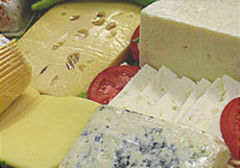Analytics, Foodstuff, Lithuania, Markets and Companies
International Internet Magazine. Baltic States news & analytics
Tuesday, 24.12.2024, 13:49
Food prices in Lithuania stand still, but oil prices decrease
 Print version
Print version |
|---|
According to Dalius Trumpa, Director of Commerce in a milk processing company Rokiskio Suris, prices of dairy products have been slightly decreasing; however, that does not satisfy consumers' demands. Last year prices of dairy products increased by approximately 10% but they have not experienced equivalent fall this year, reports ELTA.
Trumpa emphasized that decreasing prices of fuel do not have any influence on prices of the company's production, costs of raw materials is a factor of prime significance.
Linas Sasnaukas, Managing Director of Panevezys-located milk processing company Pieno Zvaigzdes, confirmed that milk and cottage cheese were sold at lower prices already. However, fuel price makes up only 4% of the product price, while the main part of it forms the price of raw milk.
Still producers see the possibility to lower prices of dairy products as prices of raw milk have dropped, the National Radio reported.
Considering possibilities of decreasing prices of food products and intentions of traders, Stanislovas Juodvalkis, the President of the Lithuanian Consumers' Association, expressed the following: "1,5 years ago, the Lithuanian Consumers' Association addressed the Lithuanian Prime Minister, the Ministry of Agriculture and the Competition Council because of unjustifiable growth of prices for products of primary importance, such as dairy products, bread, meat and vegetables. The Prime Minister obliged the mentioned institutions to analyze the issue and submit concrete proposals. It was established that some dairy processing enterprises exchanged confidential information. Then the Competition Council imposed fines on those enterprises. Manufacturers of dairy products explained that the increasing prices of fuel left them no other way out. However, today we have the opposite situation. The prices of fuel have decreased noticeably but nobody has intentions to lower prices of food products. It will be interesting to find out what excuse traders and processors will offer for that. In my opinion, the state control institutions also have to express their position".
The Chief analyst at the DnB Nord Bank, Rimantas Rudzkis, believes consumers should admit that the time period between the lowering or growing of production expenditure and product prices that consumers face at shops is rather long.
"It is not worth believing in a split-second reaction. First of all, manufacturers react to increased or decreased expenditure but the feedback is not so fast either. However, there is a rather wide gap between manufacturers' changed prices and those that consumers find in shops. Sometimes half a year may pass till changes are observed in shops. Thus, if tendencies remain the same, a change in prices will take place only in late spring", Rudzkis noted.
Traders claim that they cannot lower prices. However, all supermarket chains launch various campaigns offering discounts of 20% and more to bread, cheese, fruit and alcoholic beverages.
In the opinion of Rudzkis, strong competition is taking place among traders, especially now that consumption has been decreasing and the number of supermarket chains has been growing. However one should not believe that they cannot lower prices as nobody of them works unprofitably.
The expert considers that increase in consumption will have a big influence on traders' plans to lower prices.








 «The Baltic Course» Is Sold and Stays in Business!
«The Baltic Course» Is Sold and Stays in Business!

